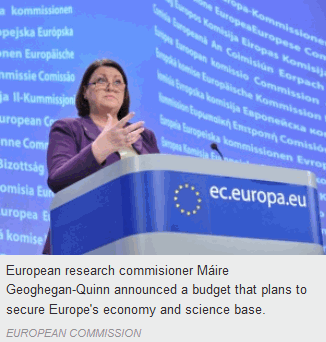|
News & Views item - December 2011 |
![]() European Commission Outlines €80 Billion Research Budget for 2014-2020.
(December 2, 2011)
European Commission Outlines €80 Billion Research Budget for 2014-2020.
(December 2, 2011)
 The
executive body of the 27-member European Union (EU), the European Commission
(EC), has unveiled its proposals for increased funding for research over the
7-year period beginning in 2014.
The
executive body of the 27-member European Union (EU), the European Commission
(EC), has unveiled its proposals for increased funding for research over the
7-year period beginning in 2014.
The EC is calling for "Horizon 2020" to be resourced with a budget of €80 billion ($A105.4 billion) up from its current €50.5 billion for projects ranging from basic research through to near-finial development of goods and/or services.
In releasing the call, research commissioner Márie Geoghegan-Quinn said: "For the first time at the European level, Horizon 2020 offers a seamless coherent package of support from idea to market, from excellent ideas to products people want to buy... We need a new vision for European research and innovation in a dramatically changed economic environment."
Whether or not the EC's budget will be realised in the current European financial crisis is a moot question but the strategy called for in the implementation of Horizon 2020 requires support for "excellent science, industrial leadership, and societal challenges".
The budgetary request for "excellent research" is €24.6 billion from which the European Research Council (ERC) would receive a 77% increase, i.e a seven-year budget of €13.2 billion.
ERC president, Helga Nowotny, told Nature and Science: "Overall I am pleased with the sum; given the general economic climate, it is very important for us we are able to maintain and continue what we've been doing in the past," which will allow the ERC to, “at least continue support for the very best researchers working in Europe”.
In addition there will be funding specifically for young researchers.
The planned budget also calls for the European Institute of Technology (EIT), established in 2008 to increase innovation and industrial research spending to get €2.8 billion for the 7-years. Up to 600 start-up companies over the funding period are hoped for, as well as provision for training for 10,000 PhD students. However, EIT is not a single institution in one location; many have been critical of the approach. EIT has an administration in Budapest, which organizes researchers in various institutions across Europe into Knowledge and Innovation Communities.
The EC proposal also calls for awarding €31.7 billion to address six key challenges facing society. Over €8 billion for health, €6.8 billion for green transport and €5.7 billion for clean energy.
Paul Boyle, president of Science Europe, a Brussels based science-advocacy group told Nature that the proposed budget hike: "demonstrates that the European Commission recognizes the strong links between science, innovation and growth... Clearly there will now be extensive debate on the breakdown of the specific budgets, including the balance of funding between the societal challenges, and on the research content within the challenges, to ensure that the questions addressed are truly those of the utmost importance."
ERC founding president Fotis Kafatos told Science: "This is the best news I have heard recently, being Greek and all that, It's a very strong indication that the importance of [basic science] has been understood by political leadership and augurs well for European development." In past years, he adds, "There was always the feeling that the political people were more interested in what were the tangible effects now."
Next the EC's proposals will be discussed by the European Parliament and the member states at the European Council, with the expectation of final agreement by the end of 2013.